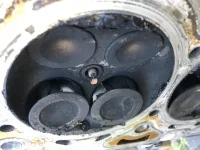PurpleHaze
3.9L Member :)
- Joined
- Oct 21, 2017
- Messages
- 233
- Reaction score
- 38
- Points
- 18
- Location
- Lawrencvile, Ga
- Buick Ownership
- Buick
Oil changes and timing chain guides affects more than GM engines. Older high mileage BMW and Nissan/Infiniti models timing chain guides seem to be effected by longer oil change intervals as well.
It seems that the issue is more related to the actually timing chain guide material used which determines how long it takes for the material to wear down. I believe that the timing chain guides are just wear items which will eventually wear down no matter if the oil is changed regularly or not. However, fresh oil can slow down the rate of wear on the guides in my opinion. How much depends on the quality of the guide material itself which various by automaker.
Many automakers are stating that the engines can go longer between oil changes yet owners are discovering that running oil too long can lead to very expensive repairs out of warranty like worn timing chain guides. GM old oil change computer values has been shorten to reflect this truth that running oil too long is not healthy for a engine. The oil can still be lubricating when at 8k miles, however the additives that reduce acids and sludge is usually depleted before the engine reach 8k miles or much sooner depending on the brand of oil; even full synthetic oil. Lubrication is only one function of oil, it also cleans and neutralizes acids.
My take, if you are going to sell the car by 100k miles then just follow the manufacturers oil change recommendation especially long ones. If you want a high mileage car to last near or past 100k miles without major work soon after, then change the oil around 3k-4k miles. Most newer cars have advanced timing chains components that need to be aligned correctly to work including the chain guides which are very susceptible to wearing down by running old oil for 10k miles, maybe even 5k miles.
Long oil changes usually only benefit the dealerships or new car buyers who may switch up every few years in the long term, not the owner who drives the car pass 100k miles. Just my opinion.
Pay now or pay later, because one way of another you will have to spend money on the engine. More oil changes over the years or one major engine repair at one time unless you swap cars often then you pay in a different way by paying on auto loans.
It seems that the issue is more related to the actually timing chain guide material used which determines how long it takes for the material to wear down. I believe that the timing chain guides are just wear items which will eventually wear down no matter if the oil is changed regularly or not. However, fresh oil can slow down the rate of wear on the guides in my opinion. How much depends on the quality of the guide material itself which various by automaker.
Many automakers are stating that the engines can go longer between oil changes yet owners are discovering that running oil too long can lead to very expensive repairs out of warranty like worn timing chain guides. GM old oil change computer values has been shorten to reflect this truth that running oil too long is not healthy for a engine. The oil can still be lubricating when at 8k miles, however the additives that reduce acids and sludge is usually depleted before the engine reach 8k miles or much sooner depending on the brand of oil; even full synthetic oil. Lubrication is only one function of oil, it also cleans and neutralizes acids.
My take, if you are going to sell the car by 100k miles then just follow the manufacturers oil change recommendation especially long ones. If you want a high mileage car to last near or past 100k miles without major work soon after, then change the oil around 3k-4k miles. Most newer cars have advanced timing chains components that need to be aligned correctly to work including the chain guides which are very susceptible to wearing down by running old oil for 10k miles, maybe even 5k miles.
Long oil changes usually only benefit the dealerships or new car buyers who may switch up every few years in the long term, not the owner who drives the car pass 100k miles. Just my opinion.
Pay now or pay later, because one way of another you will have to spend money on the engine. More oil changes over the years or one major engine repair at one time unless you swap cars often then you pay in a different way by paying on auto loans.
Last edited:






